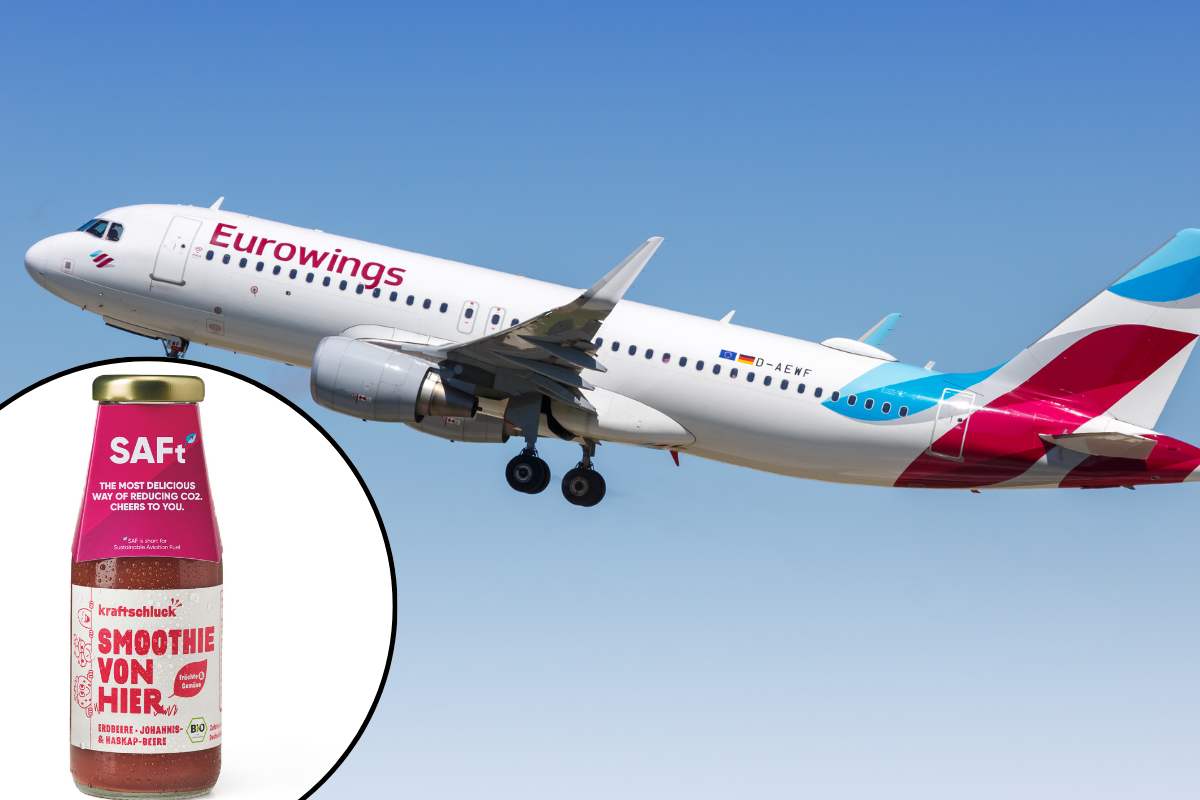
European low-cost airline Eurowings is trying to convince passengers to pay the equivalent of $21 for a small bottle of pre-packaged juice smoothie from its onboard Wings Bistro as a new way for customers to subsidize the carrier’s purchase of sustainable aviation fuel.
Sustainable aviation fuel, or SAF as it is more commonly known, is a far more environmentally friendly form of aviation fuel that is made from the waste of renewable biowaste such as used cooking oils.
Although SAFs do still produce greenhouse gasses, the development and widespread adoption of these new fuels will significantly reduce the aviation industry’s CO₂ emissions and help airlines achieve their aim of reaching net-zero by 2050.
Unfortunately, sustainable aviation fuels are incredibly expensive – especially in the current ramp-up phase of production. Essentially, the aviation industry is expecting passengers to pick up the tab for its investments in SAFs, although there are various ways that airlines are going about this.
For example, the parent company of Eurowings, the German flag carrier Lufthansa, has decided to add an environmental surcharge ranging from just €1 to €72, depending on the type of ticket purchased and distance traveled.
The surcharge applies to both the namesake Lufthansa airline and all of the group’s other carriers, including network airlines like Austrian Airlines and subsidiaries, including Eurowings.
Eurowings, however, appears to want its customers to contribute even more to its SAF investment fund with its new €19.50 (US $21) smoothie, which has been named ‘SAFt’ – a play on the German word for juice.
The airline says it will use proceeds from the sale of the SAFt smoothie to buy sustainable aviation fuel and also invest in environmental projects. In fact, the vast majority of the proceeds will go towards climate offsets, while just 10% will be invested in buying SAFs.
For discerning passengers who are able to afford this smoothie (which costs more than a freshly prepared Instagrammable smoothie at LA’s must-visit Erewhon supermarket!), they will be pleased to know that the smoothie is made in Germany, using organic fruits.
The International Air Transport Association (IATA) believes that SAFs will contribute 65% of CO₂ savings to help airlines achieve net zero by 2050, so it can’t be understated just how important this fuel is going to the industry in the coming years.
For the time being, however, SAFs are only available in limited quantities, and most aviation regulators require SAFs to be mixed with standard jet fuels for safety reasons. Work is ongoing to prove that 100% SAF-operated flights are safe.
Related
Mateusz Maszczynski honed his skills as an international flight attendant at the most prominent airline in the Middle East and has been flying ever since... most recently for a well known European airline. Matt is passionate about the aviation industry and has become an expert in passenger experience and human-centric stories. Always keeping an ear close to the ground, Matt's industry insights, analysis and news coverage is frequently relied upon by some of the biggest names in journalism.







